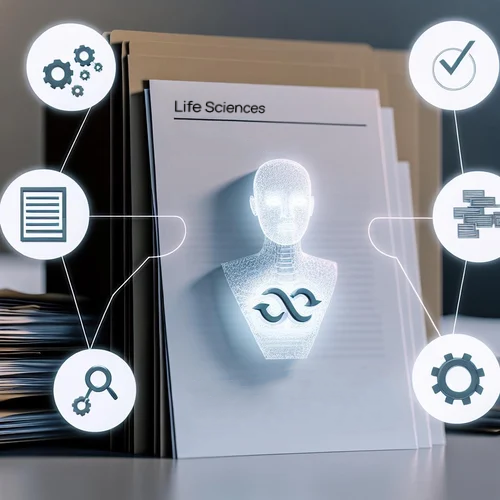How a leading pharmaceutical company specializing in clinical trials accelerated their drug development with Docugami

Industry
Life Sciences
Challenge
A major pharmaceutical company needed a faster, more accurate way to analyze thousands of lengthy clinical trial reports. Manual review was slow, labor-intensive, and diverted resources from scientific work.
Results
By adopting Docugami’s AI-powered Document Engineering, the company accelerated its clinical trial report analysis while improving accuracy and lowering costs. With only minimal human-in-the-loop training, Docugami automatically extracted and structured critical information, such as study design, safety measures, endpoints, and outcomes, into a semantic XML knowledge graph.
KEY FEATUREs
- Semantic XML Knowledge Graph of Entire Clinical Trial Reports
- Automated Extraction of Study Design, Protocols, and Outcomes
- Human-in-the-Loop Training for Higher Accuracy
- Transparent and Structured Data Outputs
- Integration with Enterprise Data Lakes and Analytics Systems
The Challenge
As global health challenges intensify, the pharmaceutical industry is under pressure to speed up the development of drugs and vaccines. Analyzing clinical trial reports is an essential step in this process, but it is complex, time-consuming, labor-intensive, and requires high accuracy levels. The traditional approach involves a manual review of thousands of lengthy documents, which creates process-driven delays and diverts resources from strategic and scientific work.A major pharmaceutical company had tried to automate the review and analysis of their clinical trial reports, with only minimal success. Conventional data extraction tools were unable to handle the complexity and diversity of the company's clinical trial reports, often missing critical data or misinterpreting information. And conventional data extraction tools were too rigid in terms of the elements they could identify and didn't allow researchers the flexibility to quickly add new areas of inquiry without a lengthy and cumbersome process. To find a more efficient approach to handling clinical trial reports, the pharmaceutical company turned to Docugami.
The Solution: How we applied Docugami's AI-powered Document Engineering to clinical trial reports
Docugami's AI-powered platform (with human-in-the-loop training) was tasked with identifying, extracting, and analyzing complex information from a repository of clinical trial reports.
Docugami’s team worked with the pharma company to integrate its document repository, which ensured a seamless flow of document uploads for processing. The AI model was trained on a subset of the company’s clinical trial reports to learn the specific variations in formats, terminology, and complex data points critical to the company’s analysis needs. The staff specified the information required across complex factors, such as:
- Study objectives, goals
- Inclusion and exclusion criteria
- Population characteristics
- Procedures followed
- Randomization process
- Data collection
- Safety measures
- Statistical analysis details
- Trial timeline
- Endpoints and outcomes
- Protocol changes, and more
Unlike conventional data extraction tools, Docugami automatically creates a full semantic XML knowledge graph of every piece of information in each document in its entirety, and how each piece of information relates to every other piece of information in each document. As a result, Docugami’s advanced AI and machine learning algorithms were able to understand the context and semantics of the clinical trial reports, enabling it to extract and analyze data with a high degree of accuracy.
Staff reviewed initial outputs to refine the AI model, enhancing its performance across the most varied elements. This limited amount of staff review and feedback improved the precision and reliability across the entire volume of documents, greatly amplifying the staff effort applied to the small initial sample.
Docugami automatically processed the documents through multiple stages, including structural, contextual, semantic, and language analysis. Using a variety of AI techniques, Docugami identified, labeled, and extracted the needed data from thousands of clinical trial documents.
The Results: Accelerated trial documentation with higher accuracy
By utilizing Docugami, the pharma company, and its stakeholders realized these benefits:
- Faster Documentation: The time required to analyze the entire volume of clinical trial reports was significantly reduced, accelerating the extensive trial documentation and analysis process.
- Decreased Operating Costs: Automating the extraction and analysis process decreased operating costs, freeing up resources for the other trial process work.
- Higher Accuracy: Docugami’s AI-driven approach provided a higher level of accuracy in data extraction and structuring from the necessary text-based documentation step compared to manual methods, which reduced the risk of errors for more reliable data.
- Access to Data: The resulting dataset was automatically exported to the organization’s data lake and other systems for ongoing and future reference and analysis.
The firm saw improved productivity and job satisfaction, greater accuracy than manual data extraction, and improved anticipation of lease renewals, scheduled maintenance, and pricing changes.
Docugami transformed the pharmaceutical company’s approach to clinical trial report analysis
By leveraging artificial intelligence to automate a large part of the traditionally laborious process, the company dramatically improved its operational efficiency and positioned itself to be far more competitive in trial development and management.
This case underscores the potential of AI and document engineering technologies to transform critical processes within the pharmaceutical industry, accelerating healthcare innovation and the ultimate delivery of life-saving medication and vaccines.
